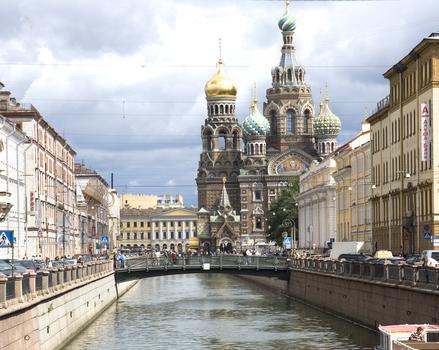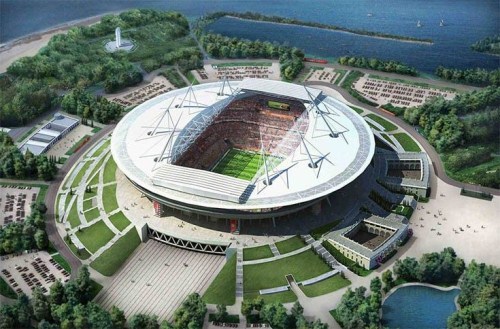By Andrew Warshaw in St Petersburg
September 20- Russia’s second city is leaving no piece of granite unturned in its efforts to play a major part in the World Cup if the country wins the vote to stage the 2018 tournament.
While the nation’s chances of success have largely centered on the capital Moscow, with its five professional clubs, the historic and culturally breathtaking city of St. Petersburg, 700 kilometres away, is determined not to get left behind.
Construction of a new state-of-the-art, Japanese-designed stadium, complete with a retractable roof and two interchangeable pitches to conserve the quality of the grass and cater for the city’s unpredictable climate, is well under way at a cost of €500 million.
Due to be completed by the end of next year, the 69,000-capacity arena on Krestovsky island, a mere 10-minute underground ride from the city centre and also accessible not only by car but also boat, is expected to stage one semifinal and several group games.
Whether or not Russia is successful on December 2, the stadium, modelled on Schalke 04 in Germany, will eventually be the new home of Zenit St. Petersburg, who temporarily play in a 23,000-capacity ground – totally inadequate given the club’s increasing status and the city’s five million population.
Formerly known as Leningrad, St. Petersburg - best seen by boat on the wide Neva River – was where the FIFA inspection team started their four-day technical visit last month.
They left cautioning that the new Russia, for all its financial might and commitment, could have its work cut out getting everything up and running in time.
Officials are confident that if South Africa could do it with the problems that were flagged up there, so can they, notwithstanding reservations that FIFA may prefer to take the tournament to England or Spain and Portugal -or even Holland and Belgium – rather than risk granting it to Eastern Europe for the first time.
“When Germany hosted the World Cup in 2006, billions of TV spectators saw the new Germany - how open it was,” said Vyatcheslav Chasov, the St. Petersburg Sports Minister.
“Now we want the people to see the same thing in Russia.”

Speaking through a translator at his office on the site of a former palace, Chasov said the image of the country had changed radically.
“We want to get rid of the old cliché that Russia is still a country that has bears running around and that it is always freezing cold,” he said.
“One aspect frequently debated is giving the World Cup to a risk-free country.
“We are not a risk in any way whether in terms of marketing, ticket sales or security.”
Although not mentioning England by name, Chasov was at pains to point out that Russia had no budget deficit to speak of.
Asked how Russia could sustain such lavish expenditure, he replied: “We do not have one rouble of international debt.
“The state of our economy is such that we can afford to spend on the World Cup without deteriorating our economic development.”
Not every aspect can be defended, however – even in St. Petersburg.
On the first day of a media visit organised and paid for by Russia’s 2018 bid committee team, Chasov admitted that the city’s antiquated airport was is in dire need of modernisation.
Five tiny booths at customs control for overseas visitors means an interminable wait to have passports stamped, a throwback to the laborious days of Soviet rule.
Not for much longer thankfully.
Next year a massive $1 billion facelift will get under way to construct a brand new complex that will be unrecognisable from the current airport and almost triple the annual passenger capacity.
“A city of this nature needs a modern airport,” Chasov conceded.
And there are little touches, too, that organisers need to work on as they crank up the international public relations campaign.
While the plush and much-lauded high-speed train from St. Petersburg to Moscow now takes a mere four hours, cutting travel time in half, the virtual absence of sockets for computer users, even in business class, was a disappointment given Russia’s supposed technological sophistication.
Just to rub salt into the wound, the on-board internet did not work either.
Not major elements of Russia’s 2018 bid of course and, perhaps, minor points.
But as the old cliché goes, little things can mean a lot.
Contact the writer of this story at zib.l1741594037labto1741594037ofdlr1741594037owedi1741594037sni@w1741594037ahsra1741594037w.wer1741594037dna1741594037
Related stories
September 2010: Department of Russian World Cup bid leader under criminal investigation
September 2010: Exclusive - England World Cup bid will not be distracted by Russian claims
September 2010: Russian 2018 bid leader claims there is corruption in England
September 2010: Smertin still confident on Russian World Cup bid
September 2010: Nigeria to campaign against Russia World Cup bid after racism allegations

